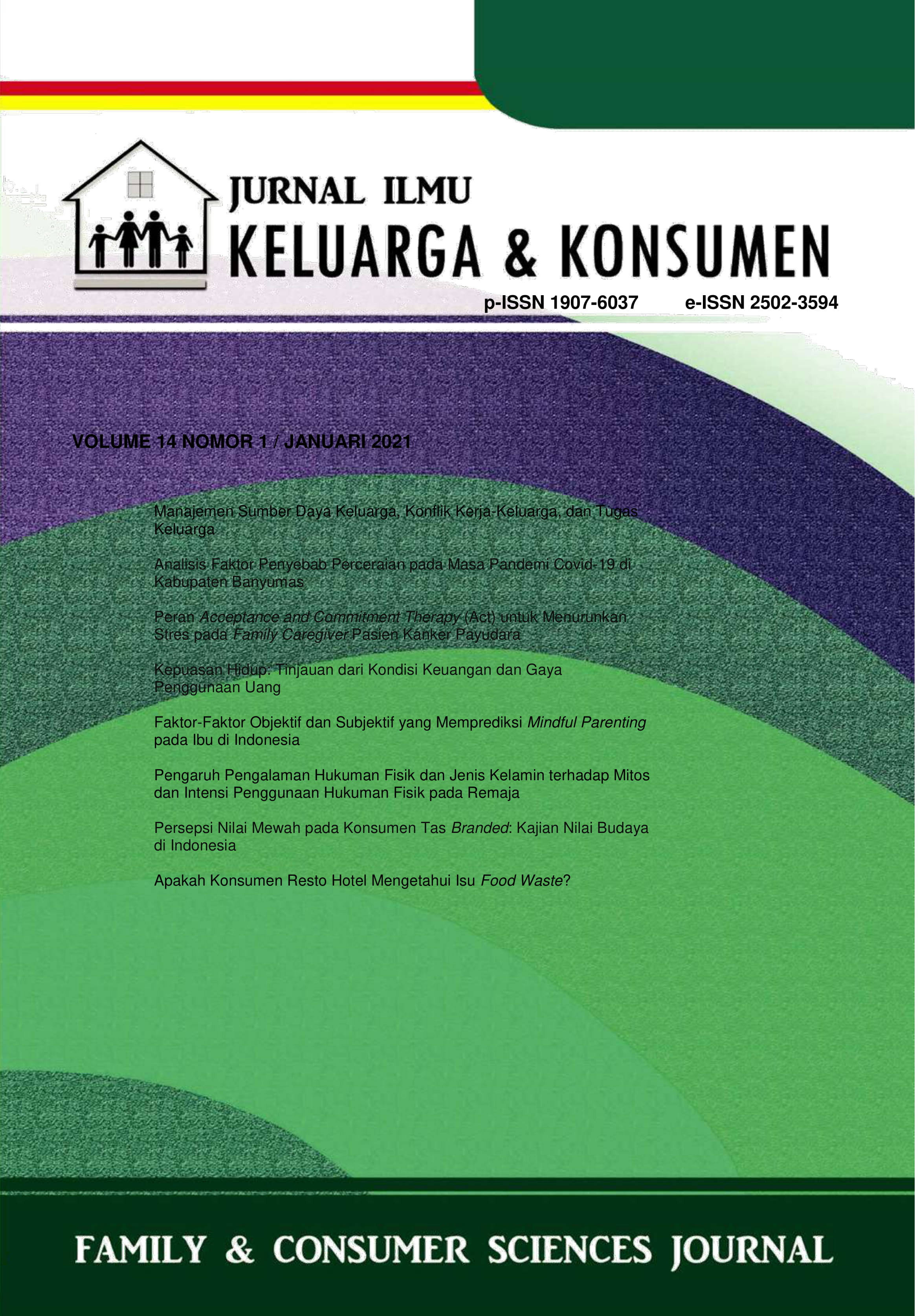KEPUASAN HIDUP: TINJAUAN DARI KONDISI KEUANGAN DAN GAYA PENGGUNAAN UANG
Abstract
Kepuasan hidup masyarakat Indonesia pada saat ini sangat dipengaruhi oleh faktor pendapatan dan kondisi keuangannya. Penelitian ini bertujuan untuk menganalisis pengaruh jumlah pendapatan, pengeluaran, tabungan, dan gaya penggunaan uang terhadap kepuasan hidup. Penelitian ini menggunakan pendekatan kuantitatif dan melibatkan 831 responden yang dipilih menggunakan teknik convenient sampling. Analisis data dilakukan dengan software G*Power untuk melihat effect size dan menggunakan teknik analisis regresi linear berganda dengan menggunakan software JASP versi 0.8.6. Hasil analisis data menunjukkan bahwa jumlah pendapatan, jumlah pengeluaran konsumtif, dan jumlah aset memiliki pengaruh yang signifikan terhadap kepuasan hidup. Gaya penggunaan uang dengan hemat dan berhati-hati memiliki pengaruh yang signifikan terhadap kepuasan hidup, sementara gaya menghabiskan uang dan menggunakan uang secara sia-sia tidak memiiki pengaruh signifikan terhadap kepuasan hidup. Penelitian ini membuktikan bahwa penggunaan uang secara terkontrol, baik untuk kebutuhan konsumtif maupun menabung untuk kebutuhan di masa depan, dapat meningkatkan kepuasan hidup seseorang. Hasil dari penelitian ini dapat menjadi rujukan untuk meningkatkan kualitas hidup manusia dengan berfokus pada cara dan gayanya di dalam memanfaatkan uang.
References
Arifin, A. Z., & Anastasia, I. (2017). The affect of financial atittude, locus of control and income on financial behavior. International Conference on Economic, Business, and Accounting, 1(1), 92-92.
Bergh, J. C. J. M. V. D. (2009). The GDP paradox. Journal of Economic Psychology, 30(2), 117–135. doi:https://doi.org/ 10.1016/j.joep.2008.12.001.
Boyce, C. J., Brown, G. D. A., & Moore, S. C. (2010). Money and happiness: Rank of income, not income, affects life satisfaction. Psychological Science, 21(4), 471–475. doi:https://doi.org/10.1177 /0956797610362671.
[BPS] Badan Pusat Statistik. (2015). Statistik 70 Tahun Indonesia Merdeka. Jakarta, ID: Badan Pusat Statistik.
Brown, S., & Gray, D. (2016). Household finances and well-being in Australia: An empirical analysis of comparison effects. Journal of Economic Psychology, 53, 17–36. doi:https://doi.org/10.1016/ j.joep.2015.12.006.
Carter, A. D. (2016). Mechanical reliability. London, UK: Macmillan International Higher Education.
Cheung, F., & Lucas, R. E. (2015). When does money matter most? Examining the association between income and life satisfaction over the life course. Psychology and Aging, 30(1), 120.
Chitchai, N., Senasu, K., & Sakworawich, A. (2020). The moderating effect of love of money on relationship between socioeconomic status and happiness. Kasetsart Journal of Social Sciences, 41(2), 336–344. doi:https:// doi.org/10.1016/j.kjss.2018.08.002.
Clark, A. E., Flèche, S., Layard, R., Powdthavee, N., & Ward, G. (2017). The key determinants of happiness and misery.
CNN Indonesia. (2018, Maret 29). Studi: Rangking kebahagiaan Indonesia di dunia 'jeblok'. Retrieved from https://www.cnnindonesia.com/gaya-hidup/20180329074022-277-286709/studi-rangking-kebahagiaan-indonesia-di-dunia-jeblok.
Dunn, E. W., Gilbert, D. T., & Wilson, T. D. (2011). If money doesn’t make you happy, then you probably aren’t spending it right. Journal of Consumer Psychology, 21(2), 115–125. Doi:https://doi.org/10.1016 /j.jcps.2011.02.002.
Gottfried, G. (2014). Global happiness report. Retrieved from https://www.ipsos.com /en/global-happiness-report.
Helliwell, J. F., Layard, R. & Sachs, J. D. (2018). World happiness report 2018. Retrieved from https://www.eur.nl/esaa /media/2018-03-worldhappinessreport 2018.
Johnson, W., & Krueger, R. F. (2006). How money buys happiness: Genetic and environmental processes linking finances and life satisfaction. Journal of personality and social psychology, 90(4), 680.
Kahneman, D., & Deaton, A. (2010). High income improves evaluation of life but not emotional well-being. Proceedings of the national academy of sciences, 107(38), 16489-16493.
Klontz, B., Britt, S. L., Mentzer, J., & Klontz, T. (2011). Money beliefs and financial behaviors: Development of the klontz money script inventory. Journal of Financial Therapy, 2(1), 1–22. doi:https://doi.org/10.4148/jft.v2i1.451.
Maison, D. (2019). The psychology of financial consumer behavior. Berlin, DE: Springer, Cham. doi:https://doi.org/10.1007/978-3-030-10570-9.
Maison, D., Marchlewska, M., Sekścińska, K., Rudzinska-Wojciechowska, J., & Łozowski, F. (2019). You don’t have to be rich to save money: On the relationship between objective versus subjective financial situation and having savings. Plos one, 14(4), 1–15. doi:https://doi.org/ 10.17605/OSF.IO/H7RK4.
Mogilner, B. C., Whillans, A., & Business, H. (2018). Time, money, and subjective well-being. Handbook of Well-Being, 495–510. Retrieved from https://www.hbs.edu/faculty /Pages/item.aspx?num=53781.
Pavot, W., & Diener, E. (2008). The satisfaction with life scale and the emerging construct of life satisfaction. The journal of positive psychology, 3(2), 137-152.
Ruberton, P. M., Lyubomirsky, S., & Gladstone, J. (2016). How your bank balance buys happiness: The importance of “cash on hand” to life satisfaction. Emotion, 16(5), 575–580. doi:https://doi.org/10.1037 /emo0000184.
Sengupta, N., Osborne, D., Houkamau, C., Hoverd, W., Wilson, M., Halliday, L., Sibley, C. (2012). Income and the fulfillment of basic needs. New Zealand Journal of Psychology, 41(2). Retrieved from http://www.psychology.org.nz/wp-content/uploads/Sibley4.pdf.
Settle, R. (2014). Does money truly buy happiness? A study of 56 countries’ levels of happiness and the contributing factors. Papers & Publications: Interdisciplinary Journal of Undergraduate Research, 3(1), 11.
Strömbäck, C., Lind, T., Skagerlund, K., Västfjäll, D., & Tinghög, G. (2017). Does self-control predict financial behavior and financial well-being?. Journal of Behavioral and Experimental Finance, 14, 30–38. doi:https://doi.org/10.1016/j.jbef.2017.04.002.
Sujarwoto, S., Tampubolon, G., & Pierewan, A. C. (2018). Individual and contextual factors of happiness and life satisfaction in a low middle income country. Applied Research in Quality of Life, 13(4), 927–945. doi:https://doi.org/10.1007/s11482-017-9567-y.
Whillans, A. V., Dunn, E. W., Smeets, P., Bekkers, R., & Norton, M. I. (2017). Buying time promotes happiness. Proceedings of the National Academy of Sciences, 114(32), 8523-8527. doi:https:// doi.org/10.1073/pnas.1706541114.
Wu, F. (2019). An examination of the effects of consumption expenditures on life satisfaction in Australia. Journal of Happiness Studies, 1-37. doi:https://doi.org/10.1007/s10902-019-00161-3.
Xiao, J. J., Ford, M. W., & Kim, J. (2011). Consumer financial behavior: An interdisciplinary review of selected theories and research. Family and Consumer Sciences Research Journal, 39(4), 399–414. doi:https://doi.org/10.1111/j.1552-3934.2011.02078.x.
Copyright (c) 2021 Jurnal Ilmu Keluarga & Konsumen

This work is licensed under a Creative Commons Attribution-ShareAlike 4.0 International License.
Authors submitting manuscripts should understand and agree that copyright of manuscripts published are held Jurnal Ilmu Keluarga & Konsumen. The statement to release the copyright to Jurnal Ilmu Keluarga dan Konsumen is stated in Copyright Release Form. Copyright encompass exclusive rights to reproduce, to distribute, and to sell any part of the journal articles in all form and media. The reproduction of any part of this journal is allowed with a written permission from Jurnal Ilmu Keluarga dan Konsumen.









